
As a nanny, you have no doubt come in contact with the revered television show from the esteemed Fred Rogers. When we were children, he taught us all about friendship, kindness, and how to treat others the way we wish to be treated. Now that we are in the position to guide and nurture young people, sharing Mister Rogers’ Neighborhood is a wonderful place to start.
This month the long-awaited documentary titled “Won’t You Be My Neighbor?’ debuted to a worldwide audience already enraptured by the tangible goodness of its subject, Mr.Fred Rogers. In Maxwell Kings’ forthcoming book, The Good Neighbor: The Life and Work of Fred Rogers, the author describes the calmness of Fred Rogers which “belied the intense care he took in shaping each episode of his program. He insisted that every word, whether spoken by a person or a puppet, be scrutinized closely, because he knew that children—the preschool-age boys and girls who made up the core of his audience—tend to hear things literally.
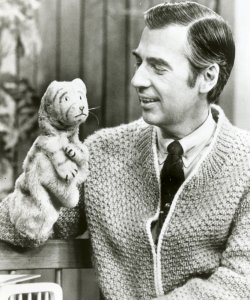
As Arthur Greenwald, a former producer of the show, once said, “There were no accidents on Mister Rogers Neighborhood.” He took great pains not to mislead or confuse children, and his team of writers joked that his on-air manner of speaking amounted to a distinct language they called “Freddish.”
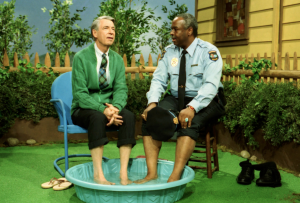
In 1977, about a decade into the show’s run, Arthur Greenwald and another writer named Barry Head cracked open a bottle of scotch while on a break and coined the term Freddish. They later created an illustrated manual called “Let’s Talk About Freddish,” a loving parody of the demanding process of getting all the words just right for Rogers. “What Fred understood and was very direct and articulate about was that the inner life of children was deadly serious to them,” said Greenwald.
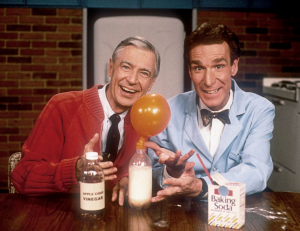
Per the pamphlet, there were nine steps for translating into Freddish:
- “State the idea you wish to express as clearly as possible, and in terms preschoolers can understand.” Example: It is dangerous to play in the street.
- “Rephrase in a positive manner,” as in It is good to play where it is safe.
- “Rephrase the idea, bearing in mind that preschoolers cannot yet make subtle distinctions and need to be redirected to authorities they trust.” As in, “Ask your parents where it is safe to play.”
- “Rephrase your idea to eliminate all elements that could be considered prescriptive, directive, or instructive.” In the example, that’d mean getting rid of “ask”: Your parents will tell you where it is safe to play.
- “Rephrase any element that suggests certainty.” That’d be “will”: Your parents can tell you where it is safe to play.
- “Rephrase your idea to eliminate any element that may not apply to all children.” Not all children know their parents, so: Your favorite grown-ups can tell you where it is safe to play.
- “Add a simple motivational idea that gives preschoolers a reason to follow your advice.” Perhaps: Your favorite grown-ups can tell you where it is safe to play. It is good to listen to them.
- “Rephrase your new statement, repeating the first step.” “Good” represents a value judgment, so: Your favorite grown-ups can tell you where it is safe to play. It is important to try to listen to them.
- “Rephrase your idea a final time, relating it to some phase of development a preschooler can understand.” Maybe: Your favorite grown-ups can tell you where it is safe to play. It is important to try to listen to them, and listening is an important part of growing.
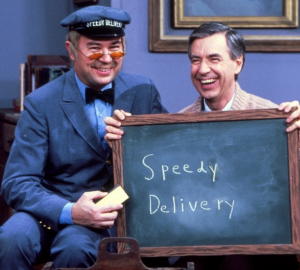
In working on the show, Rogers interacted extensively with academic researchers. Daniel R. Anderson, a psychologist formerly at the University of Massachusetts who worked as an advisor for the show, remembered a speaking trip to Germany at which some members of an academic audience raised questions about the direct approach Mister Rogers had on air.

In fact, the ‘Freddish’ philosophy of child development is actually derived from some of the leading 20th-century scholars of the subject. In the 1950s, Rogers, already well known for a previous children’s TV program, was pursuing a graduate degree at The Pittsburgh Theological Seminary when a teacher there recommended he also study under the child-development expert Margaret McFarland at the University of Pittsburgh. Rogers learned the highest standards in this emerging academic field, and he applied them to his tv program for almost half a century.
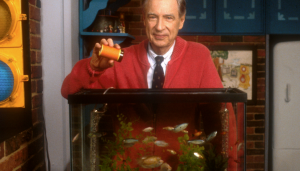
As a nanny or professional caretaker, the lessons we can glean from Fred Rogers and his entire philosophy are endless. Each episode of his beloved tv show offer practical and child-appropriate information and lessons, and the manner in which they are presented offers us so much insight into how children think. Take some time to go over the ‘Freddish’ guidelines listed above, and see how you might be able to translate some of your communications with your nanny charges into something more palatable for them.
What are some of the ways that Fred Rogers has impacted your childcare philosophy? We’d love to hear your experiences and tips for other childcare professionals – reach out to us on Facebook, Instagram, and check out the other posts on the blog!
Are you looking for an exceptional nanny or private educator? Get in touch!
Do you have what it takes to be an Adventure Nanny? Apply Now!
Portions of this article are adapted from Maxwell King’s forthcoming book, The Good Neighbor: The Life and Work of Fred Rogers
